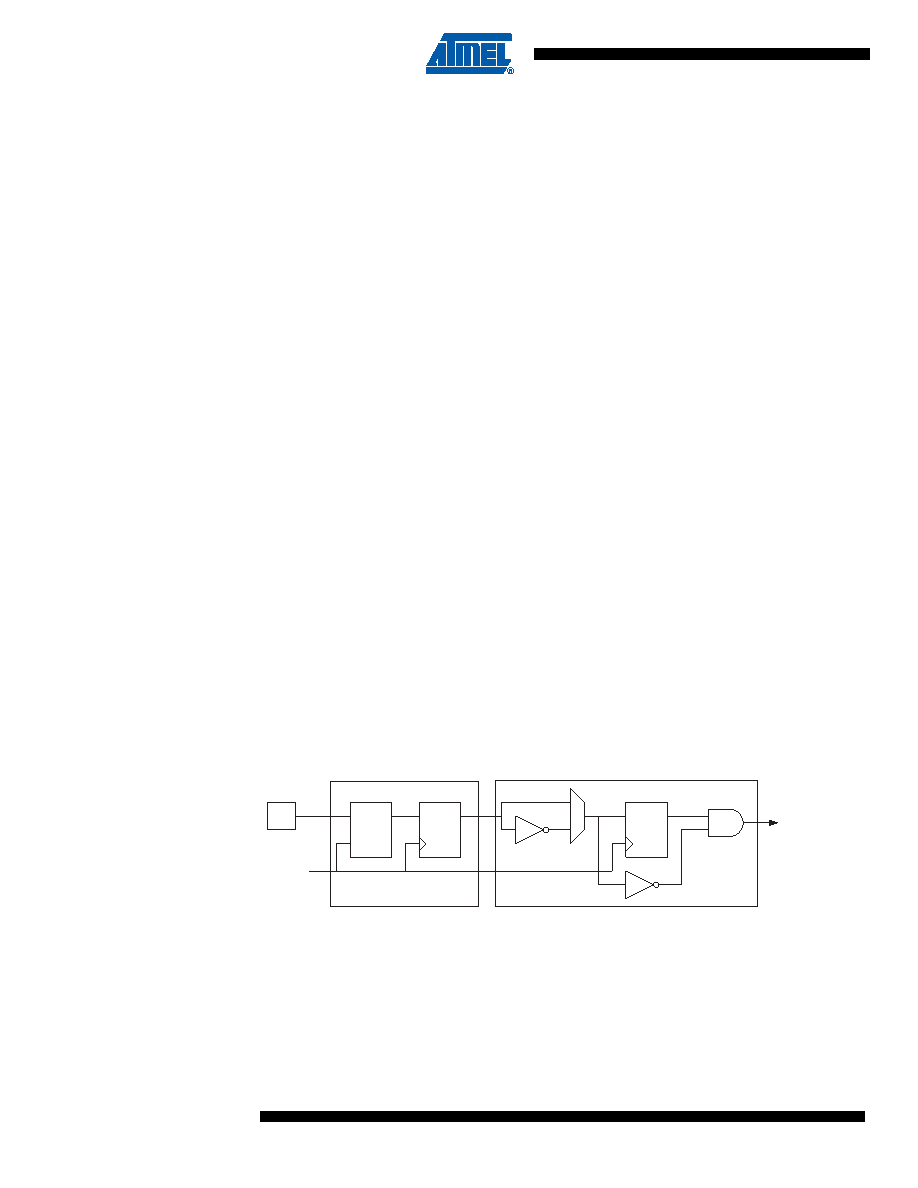- 您現(xiàn)在的位置:買賣IC網(wǎng) > PDF目錄45321 > MD83C154CXXX-30/883 (ATMEL CORP) 8-BIT, MROM, 30 MHz, MICROCONTROLLER, CDIP40 PDF資料下載
參數(shù)資料
| 型號(hào): | MD83C154CXXX-30/883 |
| 廠商: | ATMEL CORP |
| 元件分類: | 微控制器/微處理器 |
| 英文描述: | 8-BIT, MROM, 30 MHz, MICROCONTROLLER, CDIP40 |
| 封裝: | 0.600 INCH, CERAMIC, DIP-40 |
| 文件頁(yè)數(shù): | 3/210頁(yè) |
| 文件大?。?/td> | 5175K |
| 代理商: | MD83C154CXXX-30/883 |
第1頁(yè)第2頁(yè)當(dāng)前第3頁(yè)第4頁(yè)第5頁(yè)第6頁(yè)第7頁(yè)第8頁(yè)第9頁(yè)第10頁(yè)第11頁(yè)第12頁(yè)第13頁(yè)第14頁(yè)第15頁(yè)第16頁(yè)第17頁(yè)第18頁(yè)第19頁(yè)第20頁(yè)第21頁(yè)第22頁(yè)第23頁(yè)第24頁(yè)第25頁(yè)第26頁(yè)第27頁(yè)第28頁(yè)第29頁(yè)第30頁(yè)第31頁(yè)第32頁(yè)第33頁(yè)第34頁(yè)第35頁(yè)第36頁(yè)第37頁(yè)第38頁(yè)第39頁(yè)第40頁(yè)第41頁(yè)第42頁(yè)第43頁(yè)第44頁(yè)第45頁(yè)第46頁(yè)第47頁(yè)第48頁(yè)第49頁(yè)第50頁(yè)第51頁(yè)第52頁(yè)第53頁(yè)第54頁(yè)第55頁(yè)第56頁(yè)第57頁(yè)第58頁(yè)第59頁(yè)第60頁(yè)第61頁(yè)第62頁(yè)第63頁(yè)第64頁(yè)第65頁(yè)第66頁(yè)第67頁(yè)第68頁(yè)第69頁(yè)第70頁(yè)第71頁(yè)第72頁(yè)第73頁(yè)第74頁(yè)第75頁(yè)第76頁(yè)第77頁(yè)第78頁(yè)第79頁(yè)第80頁(yè)第81頁(yè)第82頁(yè)第83頁(yè)第84頁(yè)第85頁(yè)第86頁(yè)第87頁(yè)第88頁(yè)第89頁(yè)第90頁(yè)第91頁(yè)第92頁(yè)第93頁(yè)第94頁(yè)第95頁(yè)第96頁(yè)第97頁(yè)第98頁(yè)第99頁(yè)第100頁(yè)第101頁(yè)第102頁(yè)第103頁(yè)第104頁(yè)第105頁(yè)第106頁(yè)第107頁(yè)第108頁(yè)第109頁(yè)第110頁(yè)第111頁(yè)第112頁(yè)第113頁(yè)第114頁(yè)第115頁(yè)第116頁(yè)第117頁(yè)第118頁(yè)第119頁(yè)第120頁(yè)第121頁(yè)第122頁(yè)第123頁(yè)第124頁(yè)第125頁(yè)第126頁(yè)第127頁(yè)第128頁(yè)第129頁(yè)第130頁(yè)第131頁(yè)第132頁(yè)第133頁(yè)第134頁(yè)第135頁(yè)第136頁(yè)第137頁(yè)第138頁(yè)第139頁(yè)第140頁(yè)第141頁(yè)第142頁(yè)第143頁(yè)第144頁(yè)第145頁(yè)第146頁(yè)第147頁(yè)第148頁(yè)第149頁(yè)第150頁(yè)第151頁(yè)第152頁(yè)第153頁(yè)第154頁(yè)第155頁(yè)第156頁(yè)第157頁(yè)第158頁(yè)第159頁(yè)第160頁(yè)第161頁(yè)第162頁(yè)第163頁(yè)第164頁(yè)第165頁(yè)第166頁(yè)第167頁(yè)第168頁(yè)第169頁(yè)第170頁(yè)第171頁(yè)第172頁(yè)第173頁(yè)第174頁(yè)第175頁(yè)第176頁(yè)第177頁(yè)第178頁(yè)第179頁(yè)第180頁(yè)第181頁(yè)第182頁(yè)第183頁(yè)第184頁(yè)第185頁(yè)第186頁(yè)第187頁(yè)第188頁(yè)第189頁(yè)第190頁(yè)第191頁(yè)第192頁(yè)第193頁(yè)第194頁(yè)第195頁(yè)第196頁(yè)第197頁(yè)第198頁(yè)第199頁(yè)第200頁(yè)第201頁(yè)第202頁(yè)第203頁(yè)第204頁(yè)第205頁(yè)第206頁(yè)第207頁(yè)第208頁(yè)第209頁(yè)第210頁(yè)

100
8048C–AVR–02/12
ATtiny43U
13. Timer/Counter Prescaler
Timer/Counter0 and Timer/Counter1 share the same prescaler module, but the Timer/Counters
can have different prescaler settings. The description below applies to both Timer/Counters. Tn
is used as a general name, n = 0, 1.
The Timer/Counter can be clocked directly by the system clock (by setting the CSn[2:0] = 1).
This provides the fastest operation, with a maximum Timer/Counter clock frequency equal to
system clock frequency (f
CLK_I/O). Alternatively, one of four taps from the prescaler can be used
as a clock source. The prescaled clock has a frequency of either f
CLK_I/O/8, fCLK_I/O/64,
f
CLK_I/O/256, or fCLK_I/O/1024.
13.1
Prescaler Reset
The prescaler is free running, i.e., operates independently of the Clock Select logic of the
Timer/CounterCounter, and it is shared by the Timer/Counter Tn. Since the prescaler is not
affected by the Timer/Counter’s clock select, the state of the prescaler will have implications for
situations where a prescaled clock is used. One example of prescaling artifacts occurs when the
timer is enabled and clocked by the prescaler (6 > CSn[2:0] > 1). The number of system clock
cycles from when the timer is enabled to the first count occurs can be from 1 to N+1 system
clock cycles, where N equals the prescaler divisor (8, 64, 256, or 1024).
It is possible to use the Prescaler Reset for synchronizing the Timer/Counter to program
execution.
13.2
External Clock Source
An external clock source applied to the Tn pin can be used as Timer/Counter clock (clk
Tn). The
Tn pin is sampled once every system clock cycle by the pin synchronization logic. The synchro-
nized (sampled) signal is then passed through the edge detector. Figure 13-1 on page 100
shows a functional equivalent block diagram of the Tn synchronization and edge detector logic.
The registers are clocked at the positive edge of the internal system clock (clk
I/O). The latch is
transparent in the high period of the internal system clock.
The edge detector generates one clk
T0 pulse for each positive (CSn[2:0] = 7) or negative
(CSn[2:0] = 6) edge it detects.
Figure 13-1. Tn Pin Sampling
The synchronization and edge detector logic introduces a delay of 2.5 to 3.5 system clock cycles
from an edge has been applied to the Tn pin to the counter is updated.
Enabling and disabling of the clock input must be done when Tn has been stable for at least one
system clock cycle, otherwise it is a risk that a false Timer/Counter clock pulse is generated.
Each half period of the external clock applied must be longer than one system clock cycle to
ensure correct sampling. The external clock must be guaranteed to have less than half the sys-
Tn_sync
(To Clock
Select Logic)
Edge Detector
Synchronization
DQ
LE
DQ
Tn
clk
I/O
相關(guān)PDF資料 |
PDF描述 |
|---|---|
| IV80C52XXX-L16R | 8-BIT, MROM, 16 MHz, MICROCONTROLLER, PQFP44 |
| ID80C32E-25SHXXX:D | 8-BIT, 25 MHz, MICROCONTROLLER, CDIP40 |
| IT83C154TXXX-36D | 8-BIT, MROM, 36 MHz, MICROCONTROLLER, PQFP44 |
| IF280C52EXXX-L16SHXXX | 8-BIT, MROM, 16 MHz, MICROCONTROLLER, PQFP44 |
| MD80C32-30 | 8-BIT, 30 MHz, MICROCONTROLLER, CDIP40 |
相關(guān)代理商/技術(shù)參數(shù) |
參數(shù)描述 |
|---|---|
| MD83C154-L16 | 制造商:TEMIC 制造商全稱:TEMIC Semiconductors 功能描述:CMOS 0 to 36 MHz Single Chip 8-bit Microcontroller |
| MD83C154T-12 | 制造商:TEMIC 制造商全稱:TEMIC Semiconductors 功能描述:CMOS 0 to 36 MHz Single Chip 8-bit Microcontroller |
| MD83C154T-16 | 制造商:TEMIC 制造商全稱:TEMIC Semiconductors 功能描述:CMOS 0 to 36 MHz Single Chip 8-bit Microcontroller |
| MD83C154T-20 | 制造商:TEMIC 制造商全稱:TEMIC Semiconductors 功能描述:CMOS 0 to 36 MHz Single Chip 8-bit Microcontroller |
| MD83C154T-25 | 制造商:TEMIC 制造商全稱:TEMIC Semiconductors 功能描述:CMOS 0 to 36 MHz Single Chip 8-bit Microcontroller |
發(fā)布緊急采購(gòu),3分鐘左右您將得到回復(fù)。